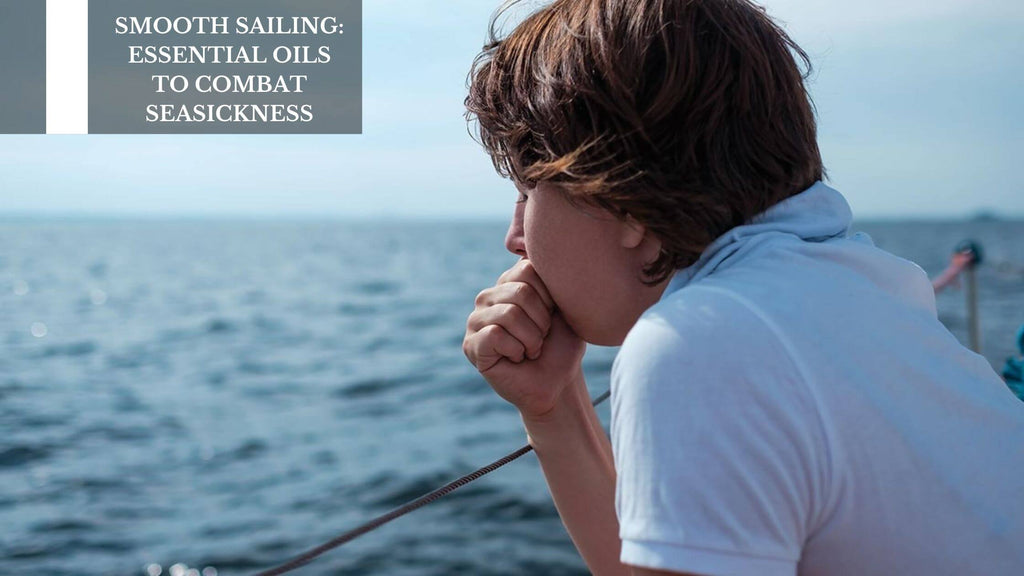Smooth Sailing: Essential Oils To Combat Seasickness

For many, the thought of setting sail on a boat or cruise ship is a dream come true. However, the reality of seasickness can quickly turn that dream into a nightmare. The queasy feeling, dizziness, and vomiting can make the experience unbearable and ruin a vacation. Fortunately, there are natural remedies that can help combat seasickness, and essential oils are one of the most effective. Essential oils have been used for centuries to treat a variety of ailments, including nausea and motion sickness. Understanding the root cause and symptoms of seasickness is crucial in combating it effectively. The feeling of seasickness, also known as motion sickness, is triggered when there is a disconnect between what your eyes see and what your inner ear senses in terms of motion. This sensory dissonance can lead to symptoms such as nausea, dizziness, sweating, and fatigue.
You may also like:
For those susceptible to seasickness, being on a boat or ship can exacerbate these symptoms, resulting in a miserable experience. It is essential to recognize the early signs of seasickness, such as yawning, cold sweats, or a feeling of unease. By understanding these symptoms and their triggers, individuals can take proactive measures to prevent or alleviate seasickness before it escalates. The natural properties of certain essential oils can help calm nausea, dizziness, and discomfort experienced while on the sea. When inhaled or applied topically, these oils can have a soothing effect on the mind and body, making them a popular choice for those prone to motion sickness. Some of the top essential oils known for their anti-nausea and calming effects include ginger, peppermint, lavender, and lemon. Ginger essential oil, in particular, is highly effective in reducing nausea and vomiting, making it a staple for many travelers. peppermint essential oil is known for its cooling and soothing properties, which can help alleviate symptoms of sea sickness such as dizziness and stomach upset.
Best essential oils used for combating sea sickness
1. Peppermint essential oil
Its invigorating aroma helps to soothe nausea and dizziness, providing relief for those experiencing motion sickness on the high seas. The crisp and cooling scent of peppermint essential oil can help to calm the stomach and alleviate symptoms of seasickness, making it a must-have for any sailor or traveler prone to motion-related discomfort. To use peppermint essential oil for seasickness, simply inhale the scent directly from the bottle or add a few drops to a cotton ball or handkerchief to sniff when feeling queasy. Alternatively, you can dilute the oil with a carrier oil and apply it to pulse points or the stomach for a more sustained effect. The refreshing properties of peppermint essential oil make it a popular choice for combating nausea and motion sickness, providing natural relief without the need for medication.
2. Lavender essential oil
When it comes to combating seasickness, lavender essential oil can be a game-changer. Its gentle, floral aroma has been used for centuries to promote relaxation and reduce feelings of nausea and discomfort. When sailing on choppy waters, inhaling lavender essential oil can help calm the senses and alleviate symptoms of seasickness. Simply add a few drops of lavender essential oil to a diffuser or inhale directly from the bottle for quick relief. You can also dilute the lavender essential oil with carrier oil and apply it to pulse points or the back of your neck for a longer-lasting effect. Not only does lavender essential oil help ease physical symptoms of seasickness, but it can also promote a sense of well-being and relaxation, making your sailing experience more enjoyable and comfortable.
3. Eucalyptus essential oil
When it comes to combating seasickness, eucalyptus essential oil can be a game-changer. Its crisp, clean aroma can help clear the air and provide relief from nausea and dizziness often associated with motion sickness. The soothing scent of eucalyptus essential oil can help calm the stomach and ease discomfort, making it a popular choice for those looking for natural remedies to combat sea sickness. Simply inhaling the aroma of eucalyptus essential oil can have a revitalizing effect, helping you feel more alert and less queasy during your sea voyage. Whether diffused in the air, applied to a cloth for inhalation, or diluted and massaged onto the skin, eucalyptus essential oil can be a valuable tool in your arsenal against sea sickness.
4. Spearmint essential oil
Its refreshing and uplifting aroma can help alleviate nausea and dizziness caused by motion sickness. The gentle nature of spearmint essential oil makes it a suitable option for those who may find the stronger scents of other essential oils overwhelming. When diffused or inhaled, spearmint essential oil can have a soothing effect on the stomach and digestive system, helping to calm queasiness and discomfort. Its crisp, minty fragrance can also help to clear the mind and promote a sense of alertness, which can be especially beneficial when feeling seasick. Consider keeping a small vial of spearmint essential oil handy during your sea travels to take advantage of its calming properties.
5. Ginger essential oil

The warm and spicy aroma of ginger essential oil has a calming effect on the stomach and can help reduce feelings of queasiness and discomfort while sailing on choppy waters. This essential oil works by aiding digestion and promoting overall stomach health, which can be particularly beneficial when dealing with motion-induced nausea. Ginger essential oil can be used in a variety of ways to combat sea sickness, such as inhaling its aroma directly from the bottle, diluting it with a carrier oil and applying it to pulse points, or adding a few drops to a diffuser for a continuous release of its soothing scent. In addition to its anti-nausea properties, ginger essential oil is also known for its anti-inflammatory and pain-relieving effects, making it a versatile and effective solution for various symptoms that may arise during sea travel.
You may also like:
FAQs
1) What are the symptoms of seasickness?
For those susceptible to seasickness, being on a boat or ship can exacerbate these symptoms, resulting in a miserable experience. It is essential to recognize the early signs of seasickness, such as yawning, cold sweats, or a feeling of unease. By understanding these symptoms and their triggers, individuals can take proactive measures to prevent or alleviate seasickness before it escalates.
2) How to apply essential oils for seasickness?
Applying essential oils to specific points on your body can help alleviate symptoms of seasickness. The inner wrists, temples, and behind the ears are great spots to apply diluted essential oils. Consistency is key when using essential oils for seasickness. Make sure to reapply as needed and stay ahead of any potential symptoms.


Leave a comment